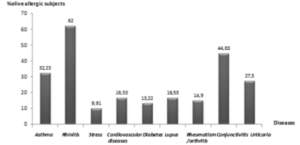Global climate change is now measurably affecting many critical physical and biological systems for human health. The World Health Organization (WHO) estimates that up to 24% of current diseases worldwide can be attributed to environmental degradation (Maamri, 2017). The effects of climate change on health can cause an increase in the prevalence of allergic respiratory diseases, asthma and exacerbations chronic obstructive pulmonary disease and premature mortality (Emberlin, s.d; Reid & Gamble, 2009; Sabour Alaoui & Barje,2017). Specifically, change in environment (pollution, lifestyles) and climate has been shown to play an important role in the increased prevalence of allergic diseases (Gennaro Damato et al., 2016).
Sabour Alaoui et al., found that 30.25% of the people surveyed in Béni Mellal, Morocco have a olive pollen allergy, this is within range of the prevalence found in urban (57.02%) and rural (42.98%) Morocco. It can be suggested that air pollution, especially diesel particulates can aggravate the allergy; by either acting directly on the respiratory tract or indirectly on the pollen grains by modifying their allergenicity. They also found that allergy to olive pollen only existed in the spring, as it is the season at which pollination of the olive tree occurs. The most common clinical symptoms of olive pollen allergies are nasal, ocular and asthmatic symptoms.
Additionally, researchers found that people allergic to olive pollen have co-morbidities with other diseases such as respiratory diseases -mainly asthma- and autoimmune diseases such as lupus and cardiovascular diseases. The results suggests that people who are allergic to olive pollen might also be susceptible to developing auto-immune diseases/ These findings should be explored in clinical studies, to investigate potential immunological cues that would improve the understanding of mechanisms associated with olive pollen allegies and auto-immune co-morbidities.
Journal Article: Sabour Alaoui et al., 2018. Olive Pollen Allergy and the Risk Of Diseases Development. International Journal of Scientific Research
Article by Sanaa Sabour Alaoui












